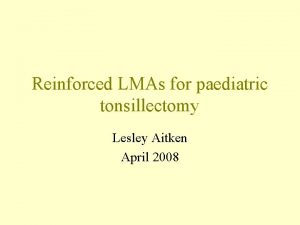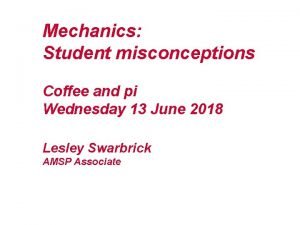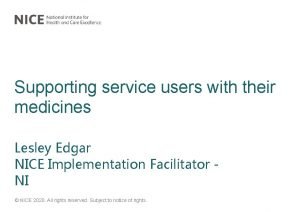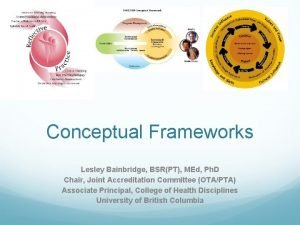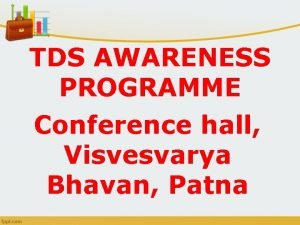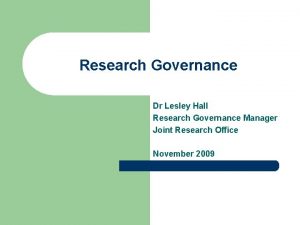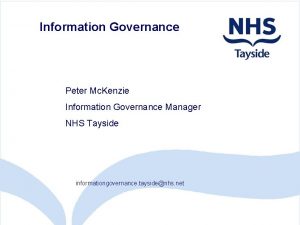Research Governance Dr Lesley Hall Research Governance Manager










































- Slides: 42

Research Governance Dr Lesley Hall Research Governance Manager Newcastle Hospitals NHS Foundation Trust 7 th November 2007 17/09/07

Outline l l l 2 Is what you are doing research? – Research/Audit/Service Evaluation Research Governance – what is it? DH Research Governance Framework and requirements for necessary risk assessment in NHS R&D Specific regulations and legislation which impact on research Example from Newcastle Trust R&D – the approvals process 17/09/07

Is what you are doing research? l l l Not all of the projects undertaken are research. If your study is an audit or service evaluation then it would NOT be classified as research However, often difficult to differentiate Most useful guidance provided by National Research Ethics Services (NRES) – (formerly COREC) – go to: http: //www. nres. npsa. nhs. uk/applicants/review/apply/re search. htm at site entrance follow links: – – 3 >Applicants > Apply > Research in the NHS …more info>> Section headed ‘Is your project research? ’ – Download ‘Defining Research Leaflet’ 17/09/07

4 17/09/07

Main differences NRES Guidance sets out key discriminates l Intent – – – 5 Research - primary aim is to derive new knowledge (eg, through clearly defined questions with systematic and rigorous methods) – What should we be doing? Audit - measure levels of treatment or care by assessing services against standards with the aim of continuous improvement – Are we doing what we should be doing? Service Evaluation – What standard does this service achieve? 17/09/07

Main differences l Treatment – l Allocation – l Research may involve allocation to treatment groups, whereas audit and service evaluation does not Randomisation – 6 Neither audit nor service evaluation uses a treatment without a firm basis of support in the clinical community If randomisation is used, it is research 17/09/07

Examples of differences 7 Research Audit Service Evaluation Is used to inform healthcare professionals about which treatments most effective What should we be doing? Is used to inform healthcare professionals if the most effective treatments and care being used - Are we doing what we should be doing? Is used to judge current treatment and care and to inform healthcare professionals if changes made are most effective - what standard does this service achieve? For example: Drug A is more effective than Drug B at treating disease C For example: is Drug A being used to treat disease C? For example: is clinic X performing better than Y at delivering the same service? 17/09/07

Research Governance – what does it mean? l 8 When you have decided it is research you must then be aware of how the research must be governed – about reducing risks associated with research by: – Ensuring scientific quality of the research through good design and review – Addressing ethical issues (particularly proper informed consent) – Ensuring safety of participants – Maintaining confidentiality of participants – Ensuring financial probity and appropriate use of NHS resources 17/09/07

Main regulations and legislation l l l l 9 Department of Health’s Research governance framework for health and social care 2 nd Edition Sept 2005 EU Clinical Trials Directive implemented in the UK through the UK Medicines for Human Use (Clinical Trials) Regulations 2004 EU Medical Devices Directives implemented in the UK through the Medical Devices Regulations 2002 (SI No 618) (2002) Human Tissue Act 2004 (implemented Sept 2006) Mental Capacity Act 2005 (partially implemented Apr 2007 to become law Oct 2007) Data Protection Act 1998 and more recently Freedom of Information Act 2000 Governance arrangements for NHS Research Ethics Committees July 2001 (GAf. REC) 17/09/07

Main principles of DH’s Research Governance Framework (RGF) l l l 10 Applies to research in the NHS involving human participants (patients or staff), their organs, tissue or data/records The aim is to bring together general principles of good practice to ensure good quality research is undertaken that respects participants’ rights, dignity and confidentiality. The host NHS organisation carries out random audits to ensure research is performed to RGF standards – particularly in relation to clear allocation of responsibilities and ensuring the research is wellmonitored 17/09/07

Before research can start research l l 11 For all research in the NHS you require NHS Trust R&D permission at each site for the study – in accordance with Research Governance Framework For clinical trials of Investigational Medicinal Products (ct. IMPs) there are specific requirements and approvals required by law 17/09/07

Risk assessment and approvals l For all projects NHS R&D departments are assessing risks on behalf of the Trust – – – l For ct. IMPs – – 12 Organisational risk: Sponsorship Investigator and other research staff risk Patient safety (ethics, attention to patient confidentiality and data protection) Scientific risk Financial risk Eurdra. CT registration and MHRA approval Adherence to legal framework and GCP regulations 17/09/07

Organisational risk - Sponsorship under RGF Must have an identified Sponsor: l l 13 All research in the NHS involving human participants (patients or staff), their organs, tissue or data MUST have a research Sponsor. Usually one Sponsor responsible for : – Ensuring that arrangements are in place to deliver the research as proposed. – The scientific quality of the research – through peer review – Ensuring all necessary approvals have been obtained – Allocating responsibilities for the management, monitoring and reporting of the research 17/09/07

Investigators and other researchers - status under RGF l l 14 The Chief Investigator is the person designated to take overall responsibility for the design, conduct and reporting of the study – they are accountable to their employer and through them to the Sponsor of the research For multi-centre studies it is common to have a Chief Investigator located at the main site and local Principle Investigators identified at local sites Honorary Research Contracts (HRCs) for non-NHS staff with direct contact and/or direct bearing on quality of care This provides NHS indemnity – The Trust indemnifies for negligent harm under Clinical Negligence Scheme for Trusts (CNST) – to enable them to do so must carry out essential checks (CRB and Occupational Health). 17/09/07

Applying for HRCs l Trust R&D will check the status of all those involved in the research to ensure all have the required NHS employment contracts or Honorary Research Contracts where needed – – 15 If employed by the University of Newcastle apply through Medical Faculty HR department (daniel. stow@newcastle. ac. uk) If employed by another organisation contact Trust R&D (Trust. R&D@nuth. nhs. uk) to arrange 17/09/07

Patient safety - ethics l Evidence of ethical review - Government Arrangements for NHS Research Ethics Committees (GAf. REC) paragraph 3. 1 states that ethical advice from the appropriate NHS REC is required for any research proposal involving: a. b. c. d. e. f. g. 16 patients and users of the NHS. This includes all potential research participants recruited by virtue of the patient or user's past or present treatment by, or use of, the NHS. It includes NHS patients treated under contracts with private sector institutions individuals identified as potential research participants because of their status as relatives or carers of patients and users of the NHS, as defined above access to data, organs or other bodily material of past and present NHS patients fetal material and IVF involving NHS patients the recently dead in NHS premises the use of, or potential access to, NHS premises or facilities NHS staff - recruited as research participants by virtue of their professional role. " 17/09/07

Ethics documentation required l l 17 NHS Ethics Committees - National Research Ethics Service (NRES – formerly COREC) Application form online – now has a section to be signed by the sponsor before submission – if NUTH Trust sponsor call Trust R&D Department (RGF Manager or Res Op Manager can sign) Now have ‘main REC’ for each study – Before you can begin you must have a favourable opinion for the main site from the main REC – If multi-centre study – must have ‘no objection at local level’ (if Site Specific Assessment necessary) for all sites. This is sent to the main REC and distributed to the Chief Investigator. Trust R&D must see evidence of a favourable opinion and ‘no objection at local level’ (if applicable) before R&D approval 17/09/07

Patient safety – Data Protection/Caldicott l l 18 Informed consent is key for use of data (although Section 60 exemption via PIAG in some exceptional situations) If information is to be recorded on a new database in the Trust, the database must be registered and should be held on Trust server If patient identifiable information is to be transferred out of the Trust e. g. to University computers, then Caldicott Guardian approval must be requested (and given) Confirmation of approvals to R&D before approval 17/09/07

Scientific Risk l Research Governance Framework states that all projects should be independently peer reviewed – this is the responsibility of Sponsor – – – 19 if large funder (eg, commercial company, large charity etc) would expect the project to have undergone rigorous peer review If own account or other – where NUTH Trust is usually Sponsor the R&D office arrange the peer review Must have a favourable peer review before R&D approval 17/09/07

Financial Risk l Projects must be fully costed – seek advice – – 20 For university staff advice through Grants and Contracts office if applicable Projects being carried out in the Clinical Research Facility will be costed there For externally-funded, non-commercial research see the Attributing revenue costs of externally funded non-commercial research in the NHS (ARCO) guidelines Commercial projects would be expected to be fully costed with appropriate overheads – also include (£ 900 R&D Set up fee in all cases and £ 650 for Pharmacy set-up fee where applicable) 17/09/07

10 minute break… After the break… l A summary of specific legislation and regulations which impact on research l Example from Newcastle Trust R&D – the approvals process 21 17/09/07

EU Clinical Trials Directive l l l 22 The EU Clinical Trials Directive includes all interventional clinical trials involving Investigational Medicinal Products (IMPs) for human use where the aim is to test the safety or efficacy of the product – (ct. IMPs) Covers all kinds of medicinal products, including pharmaceutical and biological medicines, vaccines, herbal remedies and homeopathic products Also includes a pharmaceutical form of an active substances or placebo being tested or used as a reference in a clinical trial, including products already with a marketing authorisation but used or assembled in a way different from the authorised form, or when used in an unauthorised indication, or to gain further information about the authorised form 17/09/07

Definition of a ct. IMP l Regulated in the UK by the Medicines and Healthcare products Regulatory Agency (MHRA) - official definition of a ‘medicinal product’: a) b) Any substance or combination of substances presented as having properties for treating or preventing disease in human beings ["the first limb"] Any substance or combination of substances which may be used in or administered to human beings either with a view to restoring, correcting or modifying physiological functions by exerting a pharmacological, immunological or metabolic action, or to making a medical diagnosis ["the second limb"] (Source: Article 1 of Directive 2001/83/EC as amended) 23 17/09/07

Permissions needed for ct. IMP l l 24 ct. IMP must be registered with European clinical trials database to obtain unique Eudra. CT number to be used on all correspondence Must obtain a Clinical Trial Authorisation (CTA) from Medicines and Healthcare Products Regulatory Agency (MHRA) For ct. IMPs – need to see evidence that study will be regularly monitored in accordance with GCP guidelines (pharmocovigilance – safety reporting of Adverse Events) – For commercial studies – Commercial Sponsor arranges – If non-commercial (and NUTH Trust Sponsor) monitoring can be arranged through the Newcastle Clinical Trials Unit (http: //www. ncl. ac. uk/ihs/research/clinical) Use Clinical Trials toolkit when setting up a ct. IMP! 17/09/07

Clinical Trials Toolkit - http: //www. ct-toolkit. ac. uk/route_maps. cfm 25 17/09/07

Good Clinical Practice in ct. IMPs (Amendment Regulations 2006) l l Commission Directive on Good Clinical Practice (GCP) 2006 - regulating that ct. IMPs are conducted to GCP standards – MHRA carry out site inspections Summary of main GCP Responsibilities: – – – 26 Trial documentation - Master Trial Files – including responsibilities delegation logs Adequate resources (time, facilities, staff, training, potential to recruit) Recorded evidence of investigators qualifications (signed CV), GCP training etc Rights/well-being of trial subjects (ethical approval and medical care ensured) Must comply with protocol as set out in application or have amendments approved (MHRA and Ethics) – this constitutes a serious breach in GCP if not adhered to IMPs – stored, labelled and used only in accordance with protocol Data held and stored appropriately – changes dated and initialled (no tippex) Informed consent is essential - patient MUST sign and DATE (dates cannot be added afterwards) also MUST follow the original protocol and ethics approval – MUST show that all staff trained in obtaining informed consent Regular monitoring – establishing committees and evidence of decisions made (minutes) Progress reports to Ethics and MHRA (copy to sponsor) – yearly and end to trial Safety reporting – very specific for ct. IMPs regarding reporting of Serious Adverse Events (guidance available regarding legal requirements) Records retention and archiving – patient confidentiality issues 17/09/07

EU Medical Devices Directive l What is a Medical Device? - The Medical Devices directive defines a medical devices as: Any instrument, apparatus, appliance, material or other article, whether used alone or in combination, including the software necessary for its proper application intended by the manufacturer to be used for human beings for the purpose of: – – – 27 diagnosis, prevention, monitoring, treatment or alleviation of disease, diagnosis, monitoring, treatment, alleviation of or compensation for an injury or handicap, investigation, replacement or modification of the anatomy or of a physiological process, control of conception, and which does not achieve its principle intended action in or on the human body by pharmacological, immunological or metabolic means, but may be assisted in its function by such means. 17/09/07

Permissions needed for Devices l l l 28 Devices are regulated in the UK by the Medicines and Healthcare products Regulatory Agency (MHRA) The devices legislation covers the placing on the market and putting into service medical devices This enables the device to obtain a CE mark – which is a public representation of the manufacturer's claim that the device satisfies the relevant Essential Requirements in the Directives, is fit for its intended purpose and, where required, has been independently assessed by a Notified Body. If using CE marked devices then no need to register with MHRA GREY areas – does it cross-over into medicinal products legislation (eg, device administers a medicinal product) 17/09/07

Human Tissue Act 2004 l l Implemented Sept 2006 – Regulated in the UK by The Human Tissue Authority (HTA) for the removal, storage, use and disposal of human bodies, organs and tissue from the living and deceased. What does the Act do? – – 29 Identifies the range of activities for which a licence will be required Prohibits the conduct of certain activities without a licence Establishes penalties (including custodial sentences) Prohibits commercial dealing in human material 17/09/07

Definition of relevant material l Included: – – – – – l human bodies internal organs and tissues skin and bone stem cells created inside the human body embryonic stem cells non blood derived stem cells umbilical cord blood stem cell bone marrow primary human cell cultures Not included: – – – Embryos outside the human body cultured cells which have divided outside the human body artificially created embryonic stem cells cell lines extracted DNA plasma extracted DNA Grey areas (seek advice from MTA as codes of practice not fully established): 30 – Hair and nails – Plasma and serum – whole blood – if extracting DNA may require licence 17/09/07

What do you need to use tissue? l l 31 Informed consent is the fundamental principle Consent can be for use in a specific research project if samples are to be destroyed after use – needs ethical approval but a licence is not required If stored need to have consent to store and be kept in a licensed tissue bank which has ethical approval Samples can be used without consent but ethics must approve the research and samples must be anonymised 17/09/07

Mental Capacity Act 2005 l l 32 Becomes law Oct 2007 The Mental Capacity Act 2005 provides a statutory framework to empower and protect vulnerable people who are not able to make their own decisions. It makes it clear who can take decisions, in which situations, and how they should go about this. It enables people to plan ahead for a time when they may lose capacity. 17/09/07

Five key principles of the MCA l l l 33 A presumption of capacity The right for individuals to be supported to make their own decisions That individuals must retain the right to make what might be seen as eccentric or unwise decisions Anything done for or on behalf of people without capacity must be in their best interests Least restrictive intervention of the person’s basic rights and freedoms 17/09/07

What does the MCA do? l The Act deals with the assessment of a person’s capacity and acts by carers of those who lack capacity – – l The Act deals with two situations where a designated decision-maker can act on behalf of someone who lacks capacity – – 34 The Act sets out a single clear test for assessing whether a person lacks capacity to take a particular decision at a particular time Best Interests - The Act provides a checklist of factors that decision-makers must work through in deciding what is in a person’s best interests (including written statements). Also, carers and family members gain a right to be consulted. Creates a new form of power of attorney ‘Lasting powers of attorney (LPAs) – person can appoint an attorney to act on their behalf if they should lose capacity in the future (like the current Enduring Power of Attorney (EPA), but extends to allow an attorney to make health and welfare decisions) Court appointed deputies - The Act provides for a system of court appointed deputie to be able to take decisions on welfare, healthcare and financial matters as authorised by the Court but will not be able to refuse consent to lifesustaining treatment. 17/09/07

Research and the MCA l The Act also sets out clear parameters for research – – – 35 Research involving, or in relation to, a person lacking capacity may be lawfully carried out if an “appropriate body” (normally a Research Ethics Committee) agrees that the research is safe, relates to the person’s condition and cannot be done as effectively using people who have mental capacity. Carers or nominated third parties must be consulted and agree that the person would want to join an approved research project Transitional regulations will cover research started before the Act where the person originally had capacity to consent, but later lost capacity before the end of the project. 17/09/07

Approvals required before you can begin your research 36 To recap… l NHS Trust R&D at each site for the study l Favourable ethical opinion for main and site specific assessment for additional sites l Honorary Research Contracts for non NHS staff l Data protection/Caldicott approval l MHRA approval for ct. IMPs l Appropriate arrangements for using or storing tissue l Approval from appropriate REC regarding MCA l Any other approvals Other certificates or approvals as appropriate (eg, GTAC – for gene therapy; ARSAC – radiation) 17/09/07

When to apply for various approvals l l 37 Confusing as to when to apply for certain approvals It is now a requirement of final R&D approval that we have evidence of other approvals before giving our final approval Ideally you should apply for ethics, MHRA, other approvals (eg Caldicott) at the same time as applying for R&D approval so the applications can be processed in parallel – you should NOT wait for R&D approval before applying for ethics, MHRA etc (integrated application process) At registration for Trust R&D approval we only need to see evidence that you have applied for these approvals – we will process your application awaiting final approvals 17/09/07

Making an application for Trust R&D Approval at Newcastle l l R&D application form and guidance notes on internet and Trust intranet To register a project and begin the approvals system we need: – – – – 38 R&D registration form Full (and final if possible) protocol Full breakdown of costs and funding streams Copy of NRES application form including patient consent forms and other documents (Favourable opinion/’no objection’ if available) MHRA submission details if a ct. IMP (copy of approval if available) Evidence of submission for other approvals as applicable Clinical Trial Agreements and other contracts as appropriate (eg, commercial or non-commercial contract Material Transfer Agreement (MTA) arranged if tissue is to be transferred – (R&D can arrange this) 17/09/07

Trust R&D Approvals Committee l l l We meet once a month – see Trust R&D website for deadlines for applications (2 weeks before the meeting) and dates that the Approvals Committee meets Each project is risk assessed (representatives from finance, pharmacy, lab medicine, information governance are present) Outcome of the meeting: – – – l 39 Recommend to approve subject to further clarification of issues raised and/or final approvals from ethics/MHRA/Caldicott etc Recommend NOT to approve You CANNOT begin your research in the Trust without the final letter of approval signed by the Trust CEO 17/09/07

Useful websites l l l 40 NUTH Trust R&D application form – internet under ‘Directorates’ – ‘Research & Development’ http: //www. newcastlehospitals. org. uk/directorates/research-and-development - Trust intranet under ‘R’ for ‘Research & Development’ Department of Health – Research Governance Framework http: //www. dh. gov. uk/en/Policyandguidance/Researchanddevelop ment/A-Z/Researchgovernance/index. htm NRES – for ethics applications and guidance http: //www. nres. npsa. nhs. uk/index. htm MHRA for Medical Devices and Medicinal Products http: //www. mhra. gov. uk/home/idcplg? Idc. Service=SS_GET_PAGE &node. Id=5 Eudra. CT website for registering a ct. IMP http: //eudract. emea. europa. eu/ Clinical Trials Toolkit – essential guide to ct. IMPs http: //www. ct-toolkit. ac. uk/ 17/09/07

Useful websites l NHS (ARCO) guidelines at http: //www. dh. gov. uk/en/Publicationsandstatistics/Publi cations/Publications. Policy. And. Guidance/DH_4125280 l NHS RD Forum www. rdforum. nhs. uk l Human Tissue Authority http: //www. hta. gov. uk/ Mental Capacity Act information – Department of Health http: //www. dh. gov. uk/en/Publications. And. Statistics/Bulletins/Chief Executive. Bulletin/DH_4108436 INVOLVE (formerly Consumers in NHS Research) www. involve. org. uk National Research Register (NRR) www. doh. gov. uk/research/nrr. htm l l l 41 17/09/07

Contact details l Dr Lesley Hall Research Governance Manager Trust R&D 4 th Floor, Leazes Wing Royal Victoria Infirmary Queen Victoria Road Newcastle upon Tyne NE 1 4 LP Trust R&D main office: 0191 2825959 or email Trust. R&D@nuth. nhs. uk 42 17/09/07
 Milroy's belfast study
Milroy's belfast study Lesley aitken
Lesley aitken Uncc grants
Uncc grants Lesley yates
Lesley yates Lesley yates
Lesley yates Lesley chenoweth
Lesley chenoweth A vertical light rod pq
A vertical light rod pq Lesley prescott
Lesley prescott Lesley koet
Lesley koet Lesley edgar
Lesley edgar Lesley ann downey
Lesley ann downey Gmfcf
Gmfcf Lesley bainbridge
Lesley bainbridge Lesley yoder
Lesley yoder Lesley williams singer
Lesley williams singer Senior manager vs general manager
Senior manager vs general manager Portfolio manager synergy manager parental developer
Portfolio manager synergy manager parental developer Uq rdm
Uq rdm Winmarleigh hall
Winmarleigh hall Wentz concert hall
Wentz concert hall Coopertown city hall
Coopertown city hall Borrick hall
Borrick hall What was the impact of the beer hall putsch?
What was the impact of the beer hall putsch? Walraven van hall hijos
Walraven van hall hijos Van hall larenstein, university of applied sciences
Van hall larenstein, university of applied sciences Uwm bolton hall
Uwm bolton hall Uw student health center
Uw student health center Ui hall of fame and shame
Ui hall of fame and shame Royal paragon hall floor plan
Royal paragon hall floor plan Phonon hall effect
Phonon hall effect Miles college facts
Miles college facts Classical hall effect
Classical hall effect Spokesperson
Spokesperson Tds on conference hall rent
Tds on conference hall rent Hall v florida
Hall v florida Hall encoding decoding
Hall encoding decoding Langley hall primary academy laser
Langley hall primary academy laser Robinwood alston
Robinwood alston Cathode reactivity series
Cathode reactivity series Ms hall algebra 2
Ms hall algebra 2 Audience reception theory stuart hall
Audience reception theory stuart hall Francis cecil sumner, ph.d.
Francis cecil sumner, ph.d. Hall effect definition
Hall effect definition

